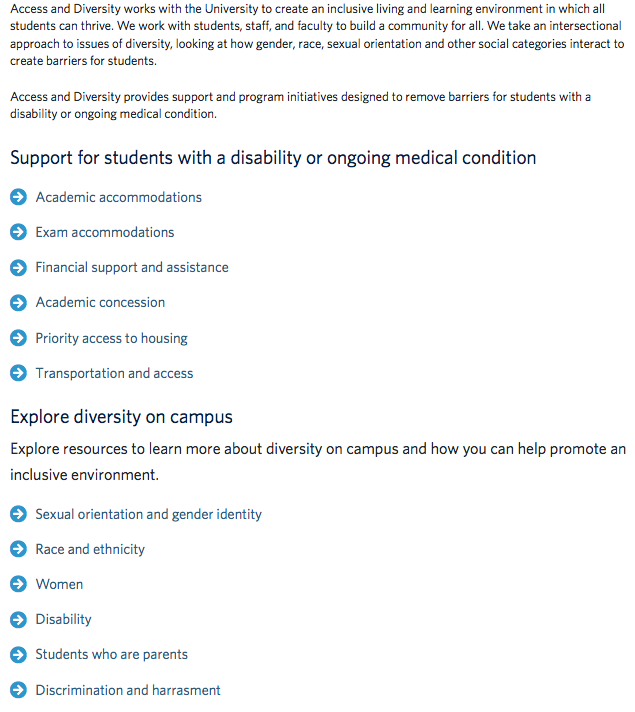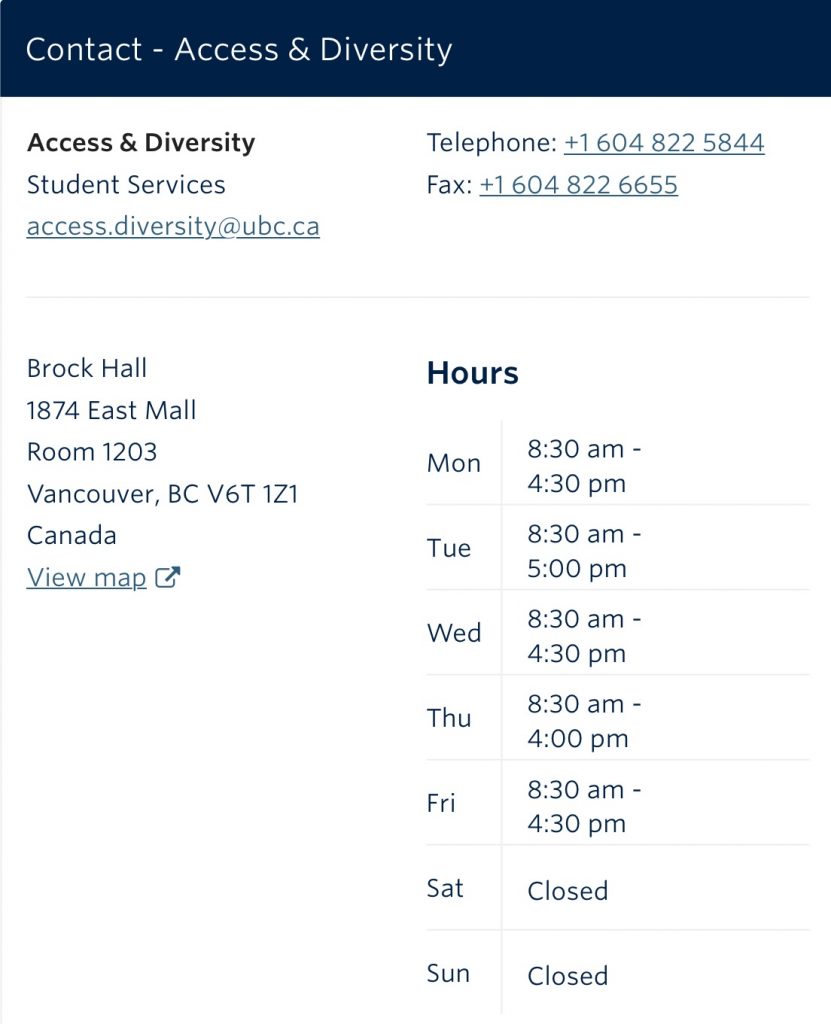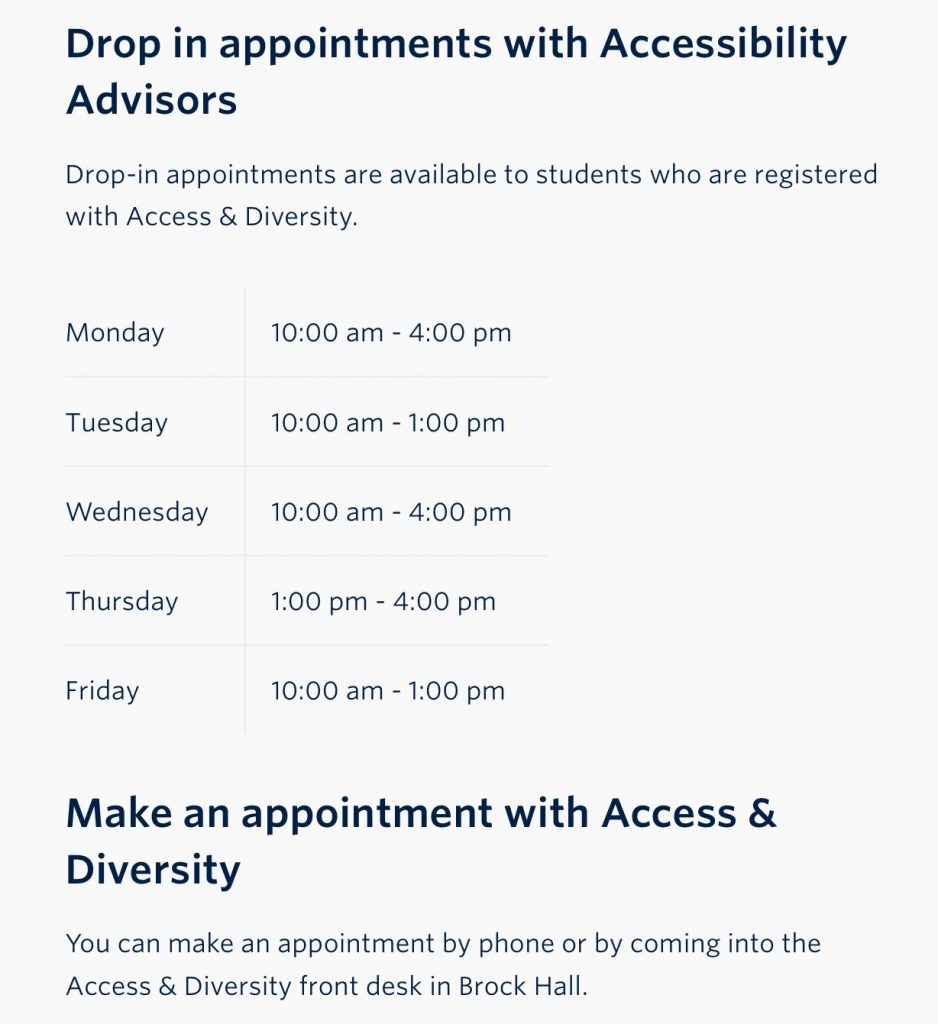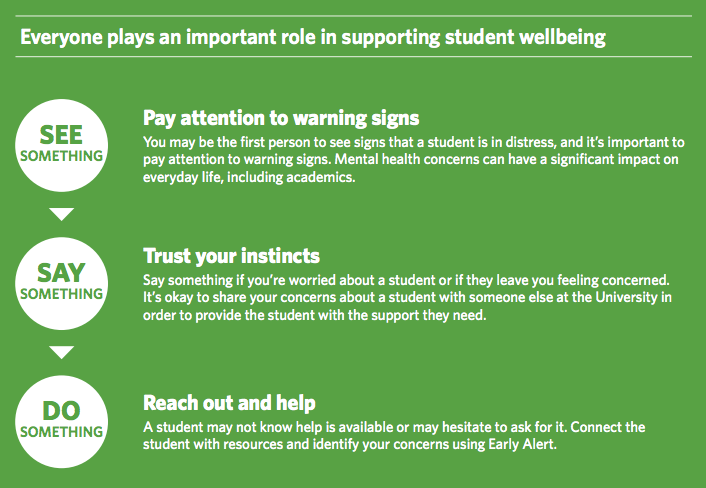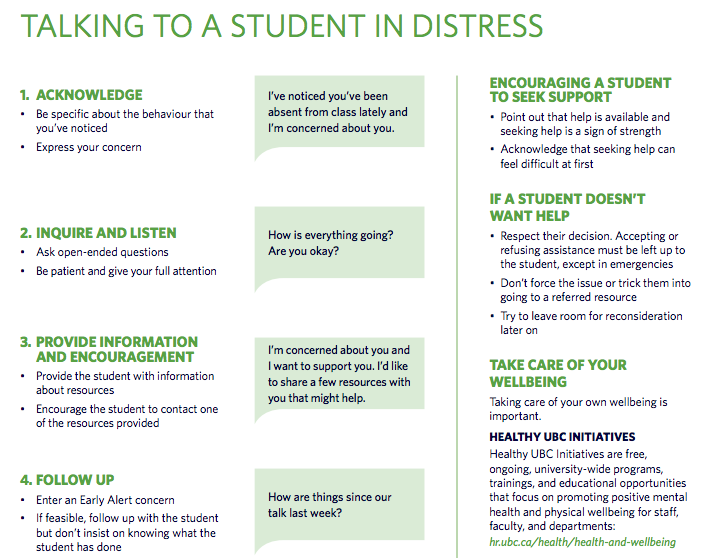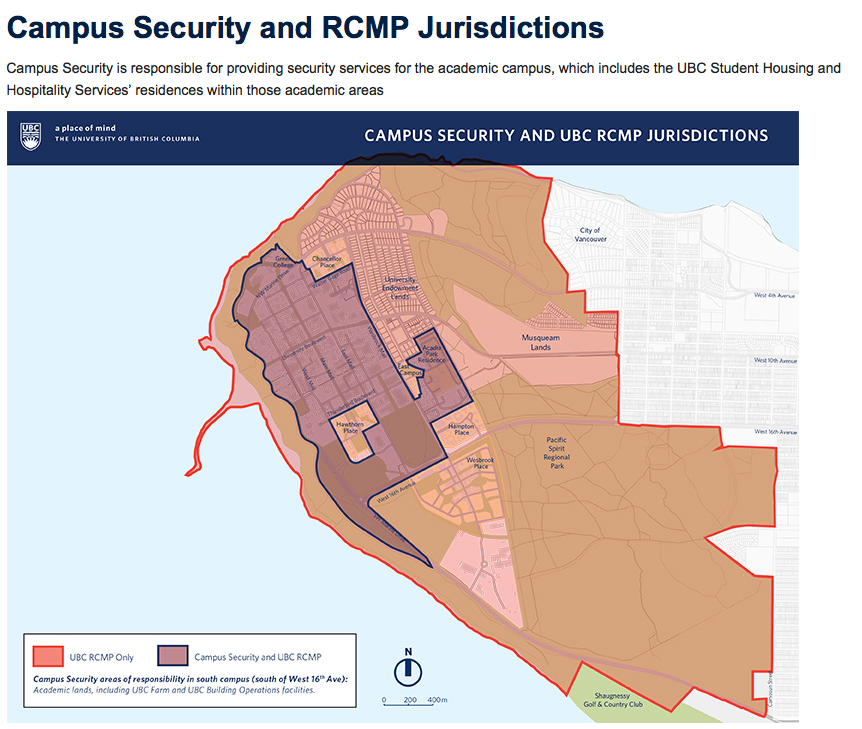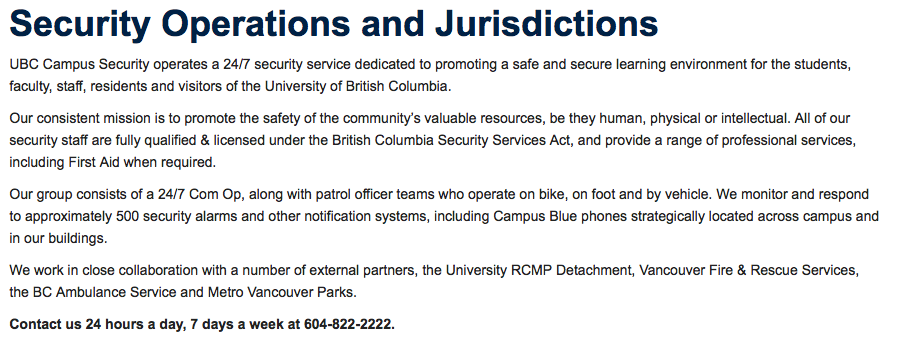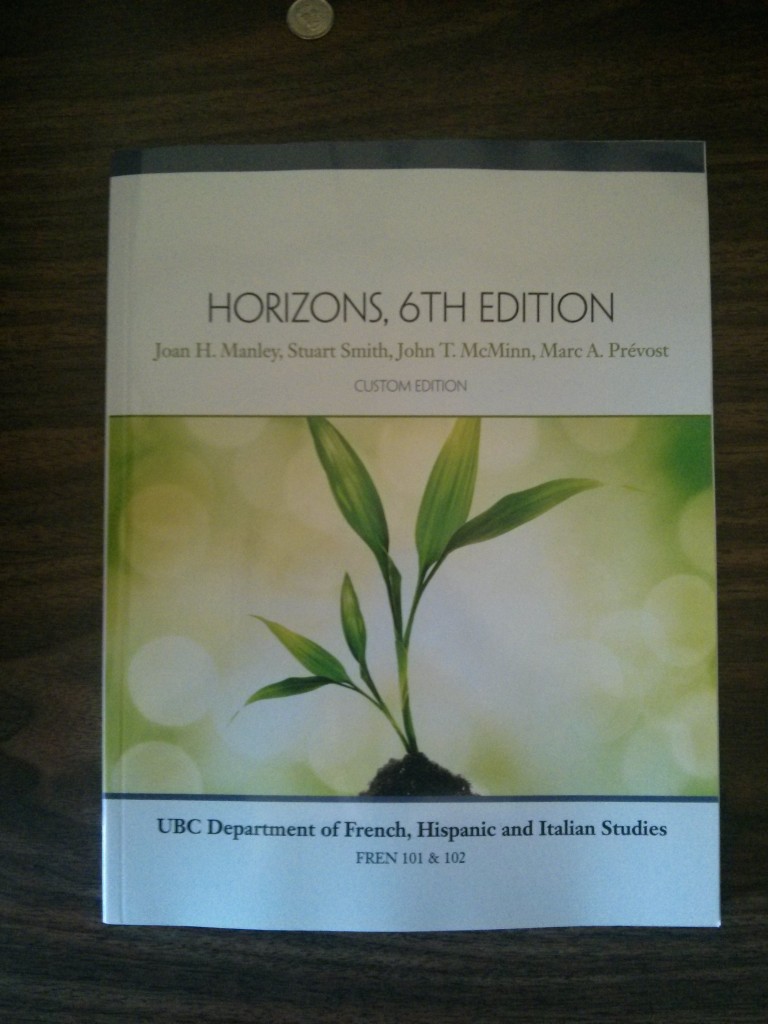Further information on French at UBC and links to further afield: as a language and a living culture and local community
Continue reading
Author Archives: Juliet O'Brien
FHIS + UBC: resources, advising, support, and care

I (Dr O’Brien) am sharing some general useful resources below: openly-accessible freely-available information from the University. I use these resources a lot in the advising side of my work, you might also find them helpful, and they could also help you to help someone else. There are many people here at UBC who can help; even if it is “just” talking to someone with whom you feel comfortable and whom you trust, who will listen to you, that alone is already a vital service.
The same goes for any need to talk and to find support, whether something has happened to you or to someone you know, and also if nothing has happened but you worry that it might. Even if sometimes this seems like an overwhelmingly large university, and impersonal through its size and complexity: UBC is a compassionate caring community, made up of individual human beings.
QUICK NAVIGATION:
- UBC French
- Academic advising
- Student support, including how to help other students
- Safety, accidents, emergencies
- UBC policies, procedures, rules, & regulations
UBC FRENCH
- FREN 101 contact information
= your instructor and the course coordinator - Days, times, and classroom locations of all the sections for FREN 101 are at UBC Student Services > Course Schedule > FREN 101
- The Department of French, Hispanic and Italian Studies
- FHIS > Undergraduate French > Advising and their FAQ
- FHIS French tutors list (not free)
- FHIS Learning Centre (free and fabulous!) – NB winter session only
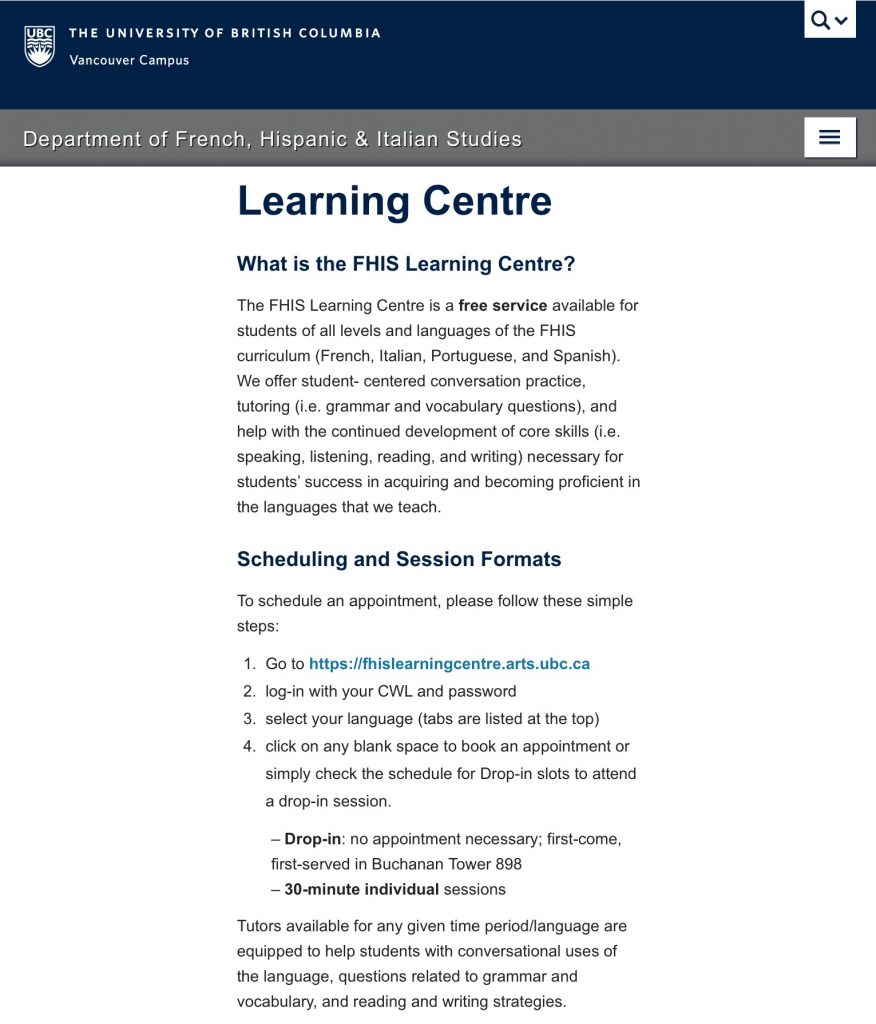
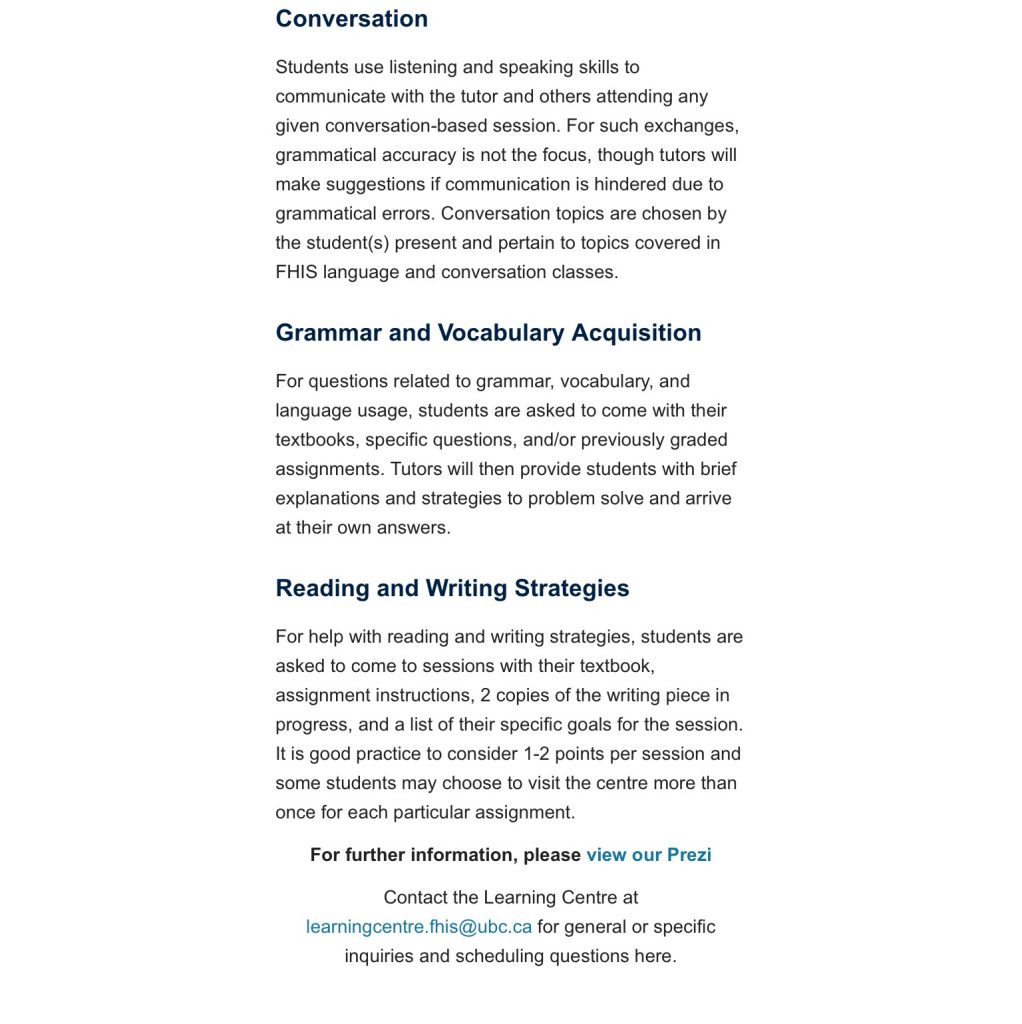
ACADEMIC ADVISING
Through talking with them about academic matters during your time here, you may have already formed relationships with individuals with whom you would consider talking about other matters.
Academic advising at the departmental level may be another set of people to talk to, and again as with advising at the Faculty or School level, this is not just about a narrow sense of immediately academic matters: for example, here are the Academic Advisers in French, Hispanic & Italian Studies; students regularly talk to us about many things, all of which (and pastoral care) form part of any individual’s whole well-being.
UBC FACULTY OF ARTS
- Arts Student Support: students.arts.ubc.ca/student-support
- Arts Academic Advising: students.arts.ubc.ca/advising
Buchanan D111
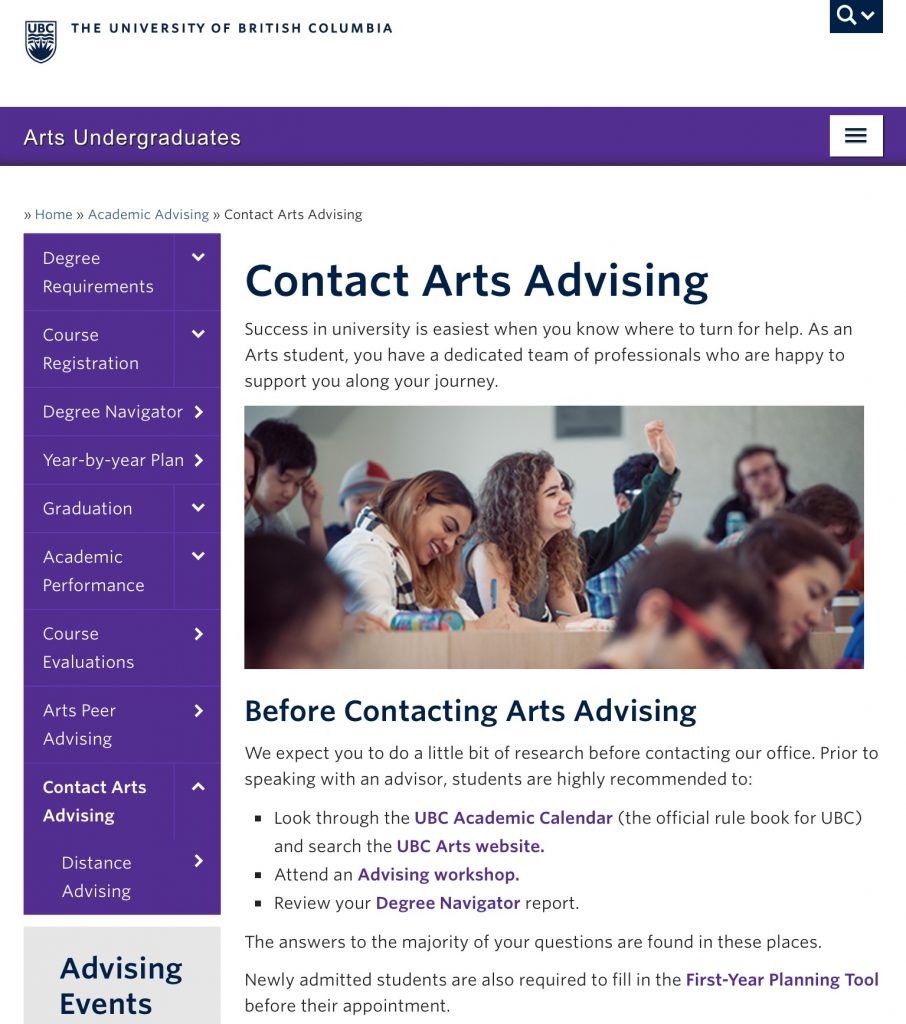
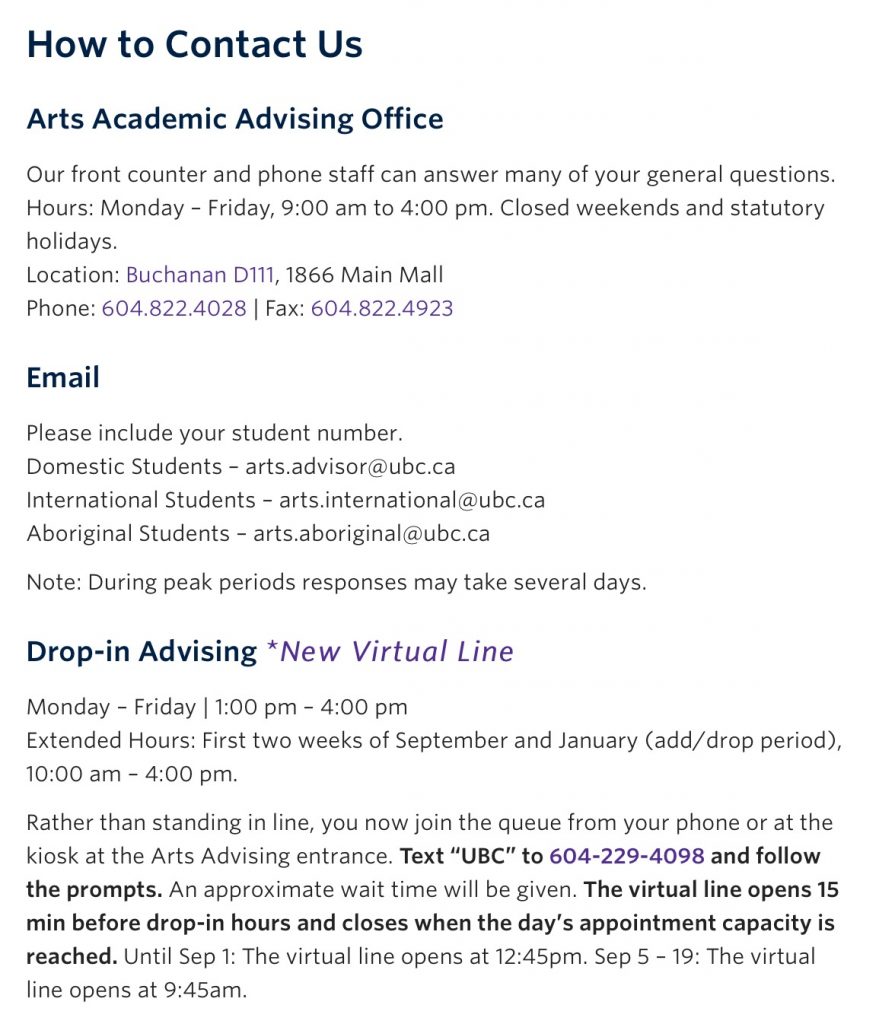
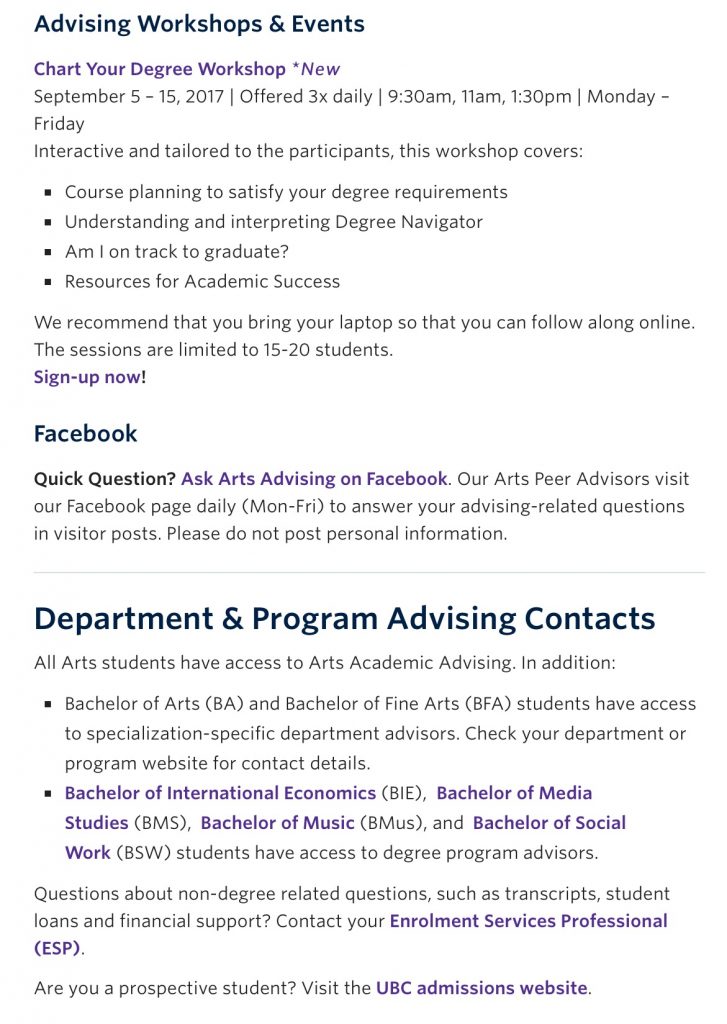
- Faculty of Arts grading guidelines: any course marks and your final grade may be adjusted to comply with these guidelines. For a version of these guidelines used by FHIS, see: Grading Guidelines for Content-Based Courses (Department of French, Hispanic and Italian Studies, UBC)
IF YOU ARE NOT IN THE FACULTY OF ARTS…
- Academic advising for all Faculties and Schools (not just the Faculty of Arts)
 STUDENT SUPPORT
STUDENT SUPPORT
IN IMMEDIATE PROXIMITY + YOUR AMS
(1) Undergraduate residential advisers, and other student leaders who have had bystander & ally training
(2) Neighbours, friends, and classmates
(3) Faculty and other instructors (graduate-student teaching assistants, for example): you see us a lot, and we are here for you
(4) AMS:
- Speakeasy:
provides free, confidential, one-on-one peer support for UBC students facing a wide variety of challenges
AMS Nest 1314
Monday-Friday 11:00 a.m. to 7:00 p.m.
To make an apppointment: come by the Speakeasy reception desk on the main floor of the AMS Nest, across from Merit Travel (room 1314) or drop by their office in the Services Wing of the AMS Nest (room 3107L). - Sexual Assault Support Centre:
offers free, confidential crisis and emotional support; committed to the education, support, and empowerment of people of all genders who are survivors of sexualized violence as well as their friends and family
AMS Nest 3127
Tel.: 604-827-5180
Monday-Sunday 8:00 a.m. to 10:00 p.m. - Resource groups: Colour Connected, Pride, Social Justice Centre, Women’s Centre
ACADEMIC ADVISING
Through talking with them about academic matters during your time here, you may have already formed relationships with individuals with whom you would consider talking about other matters.
Academic advising at the departmental level may be another set of people to talk to, and again as with advising at the Faculty or School level, this is not just about a narrow sense of immediately academic matters: for example, here are the Academic Advisers in French, Hispanic & Italian Studies; students regularly talk to us about many things, all of which (and pastoral care) form part of any individual’s whole well-being.
- Arts Student Support: students.arts.ubc.ca/student-support
- If you are in another faculty: Academic advising for all Faculties and Schools
STUDENT SUPPORT: LOOK AFTER ONE ANOTHER
- Information for students, and for students concerned about other students
- Arts Student Support: students.arts.ubc.ca/student-support
- UBC Student Services: students.ubc.ca
- UBC Wellness Services
Barber Learning Centre 183
Monday, Wednesday, Thursday, & Friday 10:00-5:00
Tuesday 10:00-4:00 - UBC Sexual Violence Prevention and Response
ACCESS & DIVERSITY
- Access & Diversity: students.ubc.ca/about/access
- Brock Hall 1203
- Email : access.diversity@ubc.ca
- ‘Phone: 604.822.5844
THE GREEN FOLDER
- The Green Folder : Student services > Assisting students in distress
= a very useful resource for faculty and for students, as everyone plays a role in supporting student wellbeing: we are all one community - Step 1: Observe
- Steps 2 and 3: Reflect and respond
- Step 4: Use Early Alert
- Talking to a student in distress
- Where students can go for help
- Encouraging a student to seek support

- downloadable PDF
EARLY ALERT
- Student Services – Faculty & Staff Resources > Early Alert
= a one-stop shop for help, that brings together all of UBC’s support services under one virtual roof. Faculty and other instructors may use this to refer you for help and expert advice. (We’re all fabulous but we’re not superhuman: yes, there are limits to academic faculty expertise and abilities!) - Early Alert > Information for students
- The faculty version, FYI: because all this information is open to all, and it’s always good to see all perspectives in order to understand something better
AND HERE’S EVEN MORE UBC SUPPORT, SERVICES, RESOURCES …
- Resources for students c/o UBC Student Services have information and offer help:
Academic matters
Accommodation for disability
Career
Discrimination and harassment
Fair treatment
Financial concerns
Health
International student matters
Legal advice
Mental and physical wellbeing
Personal safety and security
Sexualised violence
Student-led programs
Wellbeing - the Office of the Ombudsperson for Students
→ their overview
→ fairness info sheet, fairness toolkits & other resources
→ their FAQs

SAFETY, ACCIDENTS, EMERGENCIES
- Student Services > assisting students in distress
- UBC Green Folder, for assisting students in distress
- 604.822.2222 = UBC Campus Security
- 604.822.4444 = Campus First Aid
- 911 = emergency services (ambulance, fire, police): on the UBC campus, call UBC Campus Security first (for practical reasons: the fastest response)
UBC POLICIES & PROCEDURES & RULES & REGULATIONS
A quick selection of some of the most important ones…
- expectations:
student declaration and responsibilities: a reminder that upon registering as a student, you initiated a contract with the University and are bound by the following declaration:
“I hereby accept and submit myself to the statutes, rules and regulations, and ordinances (including bylaws, codes, and policies) of The University of British Columbia, and of the faculty or faculties in which I am registered, and to any amendments thereto which may be made while I am a student of the University, and I promise to observe the same.”
[…] Students are required to inform themselves of the statutes, rules and regulations, and ordinances (including bylaws, codes, and policies) and to any amendments thereto applicable at the University. For policies and procedures issued by the Board of Governors, see the University of British Columbia Policy and Procedure Handbook or the Office of the University Counsel for the official text. For policies issued by the Vancouver Senate, see the Senate for up-to-date copies.
The University authorities do not assume responsibilities for others that naturally rest with adults themselves. This being so, the University relies on the good sense and on the home training of students for the preservation of good moral standards and for appropriate modes of behaviour […]
The University and University authorities are not obligated to enforce any statutes, rules, regulations, or ordinances (including bylaws, codes or policies) if discretionarily enforceable by law or made under its, or their, power or authority.
Class times, locations, & contact information
LAST UPDATED: 2018-05-11
FREN 101-921
Tuesday & Thursday
2:00-5:00 p.m.
B211
Instructor: Niall MANN
Email: t.b.c.
Office hours: t.b.a.
FREN 101-922
Monday & Wednesday
6:00-9:00 p.m.
B211
Instructor: Soline MILET
Email: soline(dot)milet(at)ubc(dot)ca
Office hours: t.b.a.
FREN 101-923
Tuesday & Thursday
6:00-9:00 p.m.
B211
Instructor: Caitlin MIDGLEY
Email: cmidgley(at)mail(dot)ubc(dot)ca
Office hours: t.b.a.
FREN 101-924
Monday & Wednesday
2:00-5:00 p.m.
B211
Instructor: Liza BOLEN
Email: liza(dot)bolen(at)ubc(dot)ca
Office hours: t.b.a.
FREN 101-925
Tuesday & Thursday
2:00-5:00 p.m.
B318
Instructor: Magali BLANC
Email: magali(dot)blanc(at)ubc(dot)ca
Office hours: t.b.a.
NB: if a class/section is full, please DO NOT ask its instructor to put you on a waitlist. We do not keep informal individual waistlists for individual sections of FREN 101 & 102; waitlists are at the Student Service Centre just like any other registration matter. Read more at: Placement & advising.
FREN 101 coordinator: Dr Juliet O’Brien
- Office hours:
(limited summer availability, by appointment: please email in advance to arrange a mutually-convenient time)
- Office: Buchanan Tower 728
- Email: juliet.obrien@ubc.ca
The coordinator reads her email at least twice a day during usual working hours: that is, Monday to Friday, 9:00 a.m. to 6:00 p.m. She usually replies by the next working day—if you email between a Friday evening and a Sunday evening: then Monday—and sooner if the matter is urgent.
Course materials (FREN 101 and 102)
LAST UPDATED: 2018-05-11

You will be expected to have the required course materials and to bring your textbook to class (be that the printed version, the online e-book, or printed pages of the chapter we are working on in class at that time).
Please note, if you are reading this before the beginning of term: course materials may not necessarily be available right now, but should be available by the beginning of term.
1. SHORT VERSION
Manley, Smith, McMinn, Prévost
Horizons (6th edition): textbook & iLrn online exercises
Nelson/Heinle/CENGAGE 2015
- ISBN 9780176699406
= custom softbound textbook + iLrn access code / book key (on a card/sheet of paper in the “custom pack” package)
Available at the UBC Bookstore
and from Discount Textbooks (University Village) and check out these sources (Ubyssey article, 2016-09-03)
OR
- ISBN 9781285457444
= just the iLrn access code: no printed textbook (cheaper), purely online version
available online ex. directly from the publishers
Both versions include an access code / book key, giving access to http://hlc.quia.com/books:
- Horizons ebook: can also be highlighted, annotated, printed out, etc.
- Horizons electronic student activities manual: online exercises
- further materials online: more exercises, practice, self-tests, audio-enhanced vocabulary flashcards, downloadable grammar & pronunciation tutorials & podcasts, games, puzzles, audio & video, etc.
LOOKING FOR A CHEAPER VERSION?
- students who have previously taken FREN 101 & 102 often resell their course materials once they have finished the courses: if buying from them, please make sure
—that you are buying the right thing (Horizons 6th edition, as used in FREN 101+102 from September 2014 through summer 2017)
—that online access is valid until the end of the course (and beyond, if you’re also taking 102)
—and that it’s not more expensive than buying your materials new! - The Ubyssey has good advice on buying textbooks—new and used—with tips and links (ex. Craigslist):
“The ultimate guide to buying UBC textbooks” (2016-09-03) - Discount Textbooks (University Village)
- CAVEAT EMPTOR: WHEN PURCHASING YOUR COURSE MATERIALS, PLEASE ENSURE THAT YOUR ACCESS CODE DOES NOT EXPIRE BEFORE YOUR FINAL EXAM!
- If you are also taking FREN 102, make sure you have access until its end too. You may find cheaper codes for sale, always check when they expire!
- You MAY share online access codes for working on online exercises—working on them in pairs of peers is the recommended way to do them—but you MUST have your own copy of the textbook (or its ebook version). Please bring it with you to class.
GOT YOUR MATERIALS?
GOOD!
READ NEXT:
- course materials (2): online.
In this post, you will find information on how to access and use the online version of Horizons, including your e-book and the online exercises.
QUICK LINKS:
- your ebook and online exercises are at the iLrn Heinle Learning Center:
http://hlc.quia.com/books - our course = FREN 101: summer 2018
our course code = FKADDX466
- UBC Horizons iLrn Day One guide
- iLrn guide 1: introduction:
how to use your book key to set up an account and access your online exercise assignments, e-book,etc. - audio files associated with your textbook: audio running through a chapter (ex. conversations at the start of the chapter), audio flashcards at end of chapter
- iLrn guide 2: the online exercises:
where to find them, which ones to do, why, how they are graded, when to do them (and when to stop), how often, suggested sequence and pace - iLrn guide 3: extra practice: going beyond the regular set exercices, how to use iLrn for extra practice and revision
2. LONG VERSION
Horizons is available in various editions, versions, and packages; online and in bricks & mortar stores. In FREN 101, we will work on the preliminary chapter and chapters 1-4. In FREN 102, we will work on chapters 5-9.
In both courses, we will use both the textbook and the online exercises (or “eSAM,” electronic student activities manual). You will receive further details on the online exercises in the first two weeks of term.
The easiest thing for you to do is for you to buy the custom package from the UBC Bookstore.
The second-easiest but the cheapest: buying the eBook + iLrn version (and no printed book).
The reasons we’re asking you to have access to the online version (whether or not you also buy the softbound physical book):
- to give you practice exercises between classes: this will help you to prepare for each class in advance, and to review material after class. These activities are vital for reinforcing learning, and helping you to learn more, better, more solidly, deeper.
- to help your classroom learning: so that you can do or redo exercises from the textbook (in its ebook version), some of which will be worked on in class, and some of which (= the mechanical / rote exercises) you can complete at your leisure, without time pressure!
- so that you can listen to more pronunciation online: including everything that is in the textbook. You’ll also find virtual flashcards, with pronunciation, for all the vocabulary in the textbook. There are many other extra useful materials attached to the ebook version of the textbook: self-testing, for example.
WHAT TO OBTAIN: EITHER OF THE FOLLOWING TWO OPTIONS
OPTION 1:
= custom softbound textbook + iLrn package
ISBN 9780176699406
Publisher suggested retail price: $130 to $135
Available from:
- the UBC Bookstore
Price (RRP as set by the publisher in 2014 when we started using these materials, ):
$130.00
Please note that prices are set by the bookstore and subject to variation with, amongst other things, exchange rate fluctuations; they are not the responsibility of the course coordinator, the department, or indeed the publishers. - Discount Textbooks (University Village)
- students who took FREN 101 & 102 previously
This is a special custom pack, made to measure for this course and so as to be cheaper than buying the textbook (hardback, one or two volumes) and iLrn package in the standard formats, as sold by various retailers and directly by the publisher.
***OR***
OPTION 2:
= the purely online iLrn version; no printed book
ISBN 9781285457444
This is available
- directly from the publishers
Price (last checked 2017-09-21):
= $99.95 - and elsewhere online; other prices online may vary, you will be able to find this information by performing an online search for “ISBN 9781285457444”
ISBN= International Standard Book Number, a unique numerical book identifier.
Ex. Google search for “ISBN 9781285457444“
You may wish to buy the online-only version instead of the custom package, if you are happy being entirely online and just using the ebook. You will need to buy this if you have succeeded in finding a second-hand copy of the textbook for under about $25 (must include the requisite chapters! be careful: check that the textbook you’re buying isn’t just up to ch. 4, i.e. volume I of the 2-volume version of the textbook…).
BUT DO NOT BUY BOTH: JUST ONE OF THE TWO OPTIONS ABOVE!!!
Students will have access to the Horizons iLrn site, and will also have access to supplementary resources online (= this UBC Blogs site; you may also have a UBC Connect site, with similar information and anything extra added by your individual section’s instructor).
If you are not buying Horizons from the UBC Bookstore, please ensure that whatever you buy includes
- Horizons 6th ed. textbook:
at least the preliminary chapter and chapters 1-4;
if you are taking FREN 102, you will also need ch. 5-9.
***AND*** - Horizons 6th ed. iLrn access code: for the online exercises
NB: make sure you have access for the whole duration of the course, until the date of the final exam. If you are also taking FREN 102, make sure you have access until its end too. You may find cheaper codes for sale, always check when they expire!
More at the publisher’s website: see
For the textbook: it does not matter whether the version you have is printed or electronic; if it’s printed, whether it’s hardcover, looseleaf, or the custom edition; if you bring the whole book to class or just the current (and, it would be wise, previous) chapter(s); and, for the electronic version, it doesn’t matter whether you buy the whole eBook or just one eChapter at a time. So long as you have the right book in the right edition—in whatever form—with you in class, and available to work on outside class, until at least the final exam.
This is what the book looks like in the UBC custom version: its cover is different from the non-custom normal one:
READ NEXT:
- course materials (2): online.
In this post, you will find information on how to access and use the online version of Horizons, including your e-book and the online exercises.
Placement & registration: which French course to take?

Quick navigation:
-
- which French course to take?
- placement tests
- auditing
- registering late & changing registration (Credit/D/Fail)
- what to do if a class/section is full
- whom to contact for further information on French courses
(= the French first- and second-year advisers and the course coordinators for FREN 101, 102, 111, and 112)
WHICH FRENCH COURSE TO TAKE?
FREN 101 is a course for beginners: it is intended and designed for people who have no prior knowledge of French.
FREN 101 is probably the right course for you if:
- you have never learned any French before
- or you have succesfully completed French 9 (or the equivalent)
- or you have succesfully completed French 10 (or equivalent) more than five years ago
See also: “Beginning and Intermediate French,” at the Department of French, Hispanic & Italian Studies’ online information pages on undergraduate French advising
→ If you are not sure if this is the right course for you, please read on…
From UBC > FHIS > Undergraduate French advising > Beginning and Intermediate French:
Students wishing to study French at UBC after completing less than French 12 or its equivalent should start with a Beginners’ or Intermediate French course appropriate to their background (see below).
Starting Points (coming from secondary school)
- French 9 or less (or French 10 more than five years ago): FREN 101
- French 10 (or French 11 more than five years ago): FREN 102
- French 11: FREN 111
- French 12 more than five years ago: FREN 112
Successful completion of FREN 112 satisfies the Faculty of Arts Language Requirement.
Starting Points (after post-secondary French)
- FREN 101 or an equivalent college course: FREN 102
- FREN 102 or an equivalent college course: FREN 111
- FREN 111 or an equivalent college course: FREN 112
Successful completion of FREN 112 satisfies the Faculty of Arts Language Requirement.
Restrictions on Enrolment
Generally speaking, students may not earn academic credit for any course below the level for which they have qualified by previous study. For example, if you have passed French 12 within five years, you may not take any of these courses for credit. If you have passed French 11, you may not take FREN 101 or FREN 102 for credit. But there are a few exceptions:
- Students studying French to satisfy the language requirement of either the Faculty of Arts or the School of Music may begin one level below that for which they have qualified, if they lack confidence in the adequacy of their preparation.
- Any students who last studied French more than five years ago may also begin one level below that for which they have qualified. If they want to drop down more than one level, they should consult the course coordinator of the course that they wish to take.
PLACEMENT TESTS
101 vs. 102: One practical way to check which level is appropriate for you, also good for general revision:
- FREN 101 final exam from December 2013; try to see how much of it you can complete
- answer key to that exam: this is the official corrected version, which includes the correction guidelines; these were in common across all sections, so as to ensure parity in marking
- If you have a high grade (75% or more, and 80% or more on the first (grammar) and second (comprehension) sections), then 101 is probably too easy for you and 102 would be a more appropriate choice.
102 vs. 111:
- FREN 102 final exam from April 2015
- and a corrected version/answer key (including marking guidance comments for instructors, in French)
- and a second exam from April 2014
- and a corrected version of it
If you have a high grade (75% or more, and 80% or more on the first (grammar) and second (comprehension) sections), then 102 is probably too easy for you and 111 would be a more appropriate choice.
Placement Test for FREN 111 & 112:
- Department of French, Hispanic & Italian Studies > Undergraduate > Advising > Placement tests for French
= for UBC FREN 111, 112, 122, 123, 222, and 223 - these placement tests are online:
– Log in the UBC online Learning Management System Connect
– Then “self-enroll” in the “course” called Placement Test French 111-112. Click here for instructions on what to do next to access the online placement test.
AUDITING
We do not take “free auditors” (i.e. not registered) at all. Auditors are only taken in FREN 101 & 102 in exceptional circumstances. Auditing may be an option if you do not have to take the course for credit: check with your advising office. In order to audit a course, you need first to register for it in the usual way (through the Student Service Centre) and then change your registration status to that of an auditor. This process will require consultation with your instructor, and is subject to faculty approval.
See further:
- Academic Calendar » Admissions » Classification of students
- Student Services » Courses, money & enrolment » Academic planning » Auditing courses
- Registration / Change of Registration Form (PDF)
- GRADUATE STUDENT Registration / Change of Registration Form (PDF)
REGISTERING LATE & CHANGING REGISTRATION TO “CREDIT/D/FAIL” GRADING
You can add and drop courses online at the Student Service Centre until week 3 of term (week 2 in the summer session). During that time, you can also move from percentage grading to Credit/D/Fail grading, and back again, and to and fro…
After the add/drop date has passed, you can no longer make changes yourself on the SSC: you’ll need to complete a form, ask your instructor or the coordinator to sign it (the coordinator also coordinates with instructors and will ask for their consent in such matters), and then take it to your home Faculty for processing and further approval.
Here are the forms:
- Registration / Change of Registration Form (PDF)
- GRADUATE STUDENT Registration / Change of Registration Form (PDF)
UBC allows students to take a limited number of elective courses, which are normally graded on a percentage basis, for either “Credit” (a grade of 55% or higher), “D” (at least 50 but less than 55%), or “Fail” (less than 50%).
If you choose to take a course as Cr/D/F, your instructor will not know.
The Credit/D/Fail (Cr/D/F) grading policy was created to:
- encourage students’ exploration of subject matter outside their program of study
- emphasize learning and academic exploration of the new and unfamiliar
- expose students to a broader based curriculum
You may choose to take FREN 101 (and indeed 102 and 111) as Credit/D/Fail.
For FREN 112: it depends on why you are taking it.
If you are taking FREN 112 to satisfy the Arts Language Requirement, you must take it for credit: “You cannot apply Credit/D/Fail grading to the course that satisfies the Language Requirement (though you could apply it to a pre-requisite course).”
(Faculty of Arts » Academic Advising » Degree Requirements » Language Requirement)
- information from the Faculty of Arts
- information from Student Services: includes how it looks on your transcript, an eligibility checklist, and awards implications
- information in the University Academic Calendar
- the Senate Policy on Credit/D/Fail Standing
 WHAT TO DO IF A CLASS/SECTION IS FULL?
WHAT TO DO IF A CLASS/SECTION IS FULL?
First, some tips from the Ubyssey (2016-09-02).
Next, from our home Faculty, Arts Academic Advising > Course Registration > Full courses, with any extra comments specific to FREN 101 in italics:
Things you can do if the course you want is full
There are a couple of ways to deal with full classes and which one is applicable depends on the particular course.
On-line waitlists: Some courses have waitlists. That means you can register for the waitlist in the SSC and the department will move people into classes as spaces become available. These waitlists look like sections, but they will say “waitlist”. Note: registering for a waitlist will take up credits. You will not be notified that you have been moved from the waitlist into the course so regularly check your timetable in the SSC.
- If there is a waitlist for FREN 101, it will be at the SSC. If you do not see a waitlist there, that means that there is no waitlist.
Informal waitlists: Some instructors have informal waitlists. During the summer and in the first weeks of class, they may sign Change of Registration Forms for students on their waitlists or who come to class and request it. Not all instructors do this, but it doesn’t hurt to ask.
- FREN 101: There are no informal wait-lists for this course or for individual sections/instructors: all registration goes through the Student Service Centre, for practical reasons. The rationale is that it is impossible to integrate informal wait-lists—be they one single one maintained by one of the department administrative staff (and this would entail employing another person just for that purpose, given the numbers of students taking French and Spanish courses) or several separate lists, one for each instructor and maintained by them—with actual seats via formal registration.
- For changes of registration for FHIS department courses, please DO NOT USE the forms at Arts Advising (filling it out and submitting it via Arts Advising): it is not accepted by FHIS.
Instead, please print out, complete, and have BOTH your instructor AND the coordinator sign the Department of French, Hispanic and Italian Studies Request to “Force” Registration Into a Full Course form. - Note also that completing such a form, even with the consent of both the instructor and the coordinator, does not guarantee you a seat in that class: final decisions rest with the department head, as some students have higher priority than others (ex. final-year students in Arts who need to take a course in order to satisfy the language requirement and be able to graduate)
Check the course schedule regularly: You’ll be surprised at how many people make changes to their schedule all summer, and if someone drops a course while you’re on the system, you can enter it that way.
- Yes: this is the NUMBER ONE BEST TIP EVER for getting into a full class
Try to find another class: Try using the Course Search function on the UBC Course Schedule to find another suitable course if you cannot get into the one you want.
- Tip 1: If you are interested in French but do not need to take it to satisfy the language requirement, take a look at the courses offered by UBC Continuing Studies.
- Tip 2: If you are interested in French because you need to satisfy the language requirement, remember that you may satisfy that language requirement with any of thirty-odd languages taught at UBC (not just French) so take a look at the full range of languages offered by UBC. One of the advantages of this university’s size is the number of languages it is able to offer. French is of course the best language in the world 🙂 but some other languages might be even more relevant to *your* field of study and academic and future work interests.
- Tip 3: the languages offered by UBC include lesser-taught languages in smaller classes. Half to two-thirds of the size of our (oversized) French clases. Especially if you are learning a language for the first time, small classes = good.
- Tip 4: to satisfy the language requirement, you don’t necessarily have to take (a) course(s) up to the requisite level. You can take a proficiency test; this is also an option for languages not offered in UBC courses.
- Tip 5: If you need to satisfy a distribution requirement by taking an elective in Arts, this doesn’t have to be a language course (check with your faculty’s academic advising office). The Faculty of Arts covers a wide range of subjects, so do take a look at all the courses offered by the Faculty of Arts. It could be a wonderful opportunity to discover a new field of knowledge, be that for cultural enrichment, the pleasure of intellectual adventure, or to make exciting new cross-disciplinary connections with your main field(s) of academic interest.
See also: Faculty of Arts > Academic Advising > Degree requirements: the language requirement - Tip 6: If you are not in the Faculty of Arts (Commerce, Engineering, Music, Science, etc.) and have questions about language and distribution requirements, please consult Academic Advising in your home Faculty or School
Sometimes, it is not possible to get into a full course: For some courses such as Economics, French, Hispanic and Italian, instructors are not able to add students to their full classes.
- #truefact. There are pedagogical and practical reasons for limiting language class sizes.
What if the tutorial, lab or discussion group is full?
Sometimes, there will be room in the class but the tutorial (lab or discussion group) is full. If this is the case, keep your seat in the class and continue checking to see if a seat opens in one of the associated tutorial sections. If they all remain full, speak to the professor on the first day of class and request a seat in the tutorial. Please note – if any seat opens that does not conflict with your schedule, you should take it. Do not wait for a seat to open in your preferred timeslot. Tutorials are small and you will need to be flexible.
- Registration in FREN 101 labs (for winter session daytime sections, i.e. finishing before 5 p.m.) must be done through the Student Service Centre. Not applicable for summer session classes, in which there is no lab.
- For changes of registration for FHIS department courses, please DO NOT USE the forms at Arts Advising (filling it out and submitting it via Arts Advising): it is not accepted by FHIS.
Instead, please print out, complete, and have BOTH your instructor AND the coordinator sign the Department of French, Hispanic and Italian Studies Request to “Force” Registration Into a Full Course form. - Note also that completing such a form, even with the consent of both the instructor and the coordinator, does not guarantee you a seat in that class: final decisions rest with the department head, as some students have higher priority than others (ex. final-year students in Arts who need to take a course in order to satisfy the language requirement and be able to graduate)
If you are in your last year at UBC
If you’re in your graduating year, you will not be excluded from taking a required course due to space. This rule does not apply to electives or preferred sections. If a course you need is full, consult your department advisor.
NB: you may satisfy the language requirement with any of thirty-odd languages taught at UBC (not just French); by taking (a) course(s) up to the requisite level, or by taking a proficiency test; the latter is also an option for languages not offered in UBC courses
From FHIS > Undergraduate French advising:
- Full classes
If the class is full, please check the Student Service Centre periodically for available seats. - Waiting lists
The department keeps waiting lists only for new sections that may be opened in a given course. They will be found at the Student Service Centre with the designation WL. - “Force” registration into a full course [Download Form]
Departmental “force” forms are used only to force a student into a full section during the first days of classes.
- NB “force” registration = for final-year undergraduate students in the Faculty of Arts who need to take certain courses in order to graduate. For example: winter session 2017, taking FREN 112, or FREN 111 (term 1) and 112 (term 2), to satisfy the Arts language requirement.
- Please print out, complete, and have BOTH your instructor AND the coordinator sign the form.
FURTHER QUESTIONS, LOOKING FOR FURTHER INFORMATION?
Department of French, Hispanic & Italian Studies
→ French advising
→ FAQ
WHOM TO CONTACT FOR FURTHER INFORMATION ON FRENCH COURSES?
FHIS First and Second Year Advising and Placement
Dr. Michael O’Hagan, Office: BuTo 705
– Office hours: see faculty profile page
– E-mail: michael.ohagan@ubc.ca
and
Dr Juliet O’Brien, Office: BuTo 728
– Office hours: see faculty profile page
– Email: juliet.obrien@ubc.ca
FREN 101 co-ordinator:
Dr Juliet O’Brien, Office: BuTo 728
– Office hours: see faculty profile page
– Email: juliet.obrien@ubc.ca
FREN 102 co-ordinator:
Dr Juliet O’Brien, Office: BuTo 728
– Office hours: see faculty profile page
– Email: juliet.obrien@ubc.ca
FREN 111 co-ordinator:
Dr Robert Miller, Office: BuTo 707
– Office hours: see faculty profile page
– Email: robert.amiller@ubc.ca
FREN 112 co-ordinator:
Dr Robert Miller, Office: BuTo 707
– Office hours: see faculty profile page
– Email: robert.amiller@ubc.ca
Syllabus & schedule
LAST UPDATED: 2018-05-11
Course information may be subject to change over the course of the term; the most up-to-date official version will be the one here on this site. Details of the weekly schedule may vary somewhat from section to section and from instructor to instructor, but following the same general structure and order.
- FREN 101-922
FREN 101-924
Monday & Wednesday syllabus & schedule: PDF (general version, last updated 2018-05-11) - FREN 101-921
FREN 101-923
FREN 101-925
Tuesday & Thursday syllabus & schedule: PDF (general version, last updated 2018-05-11)
The full course description and syllabus here below is for all sections of FREN 101 in general: some details will vary between winter and summer sessions, and in winter sessions between daytime and evening sections.
CONTENTS
- content & objectives
- eligibility
- required textbook & course materials
- modes of assessment, distribution of marks, and work & expectations:
- advice & assistance
- co-ordinator contact information
- policies
- UBC admin information (warnings about the final examination, dates for withdrawal from the course without / with a W on one’s transcript)
- weekly schedule:
(Monday & Wednesday version, and Tuesday & Thursday version)
The general schedule is intended to help you plan and organize your work, and prepare properly for class. It outlines, week by week:- what work you should prepare ahead, for the next class
- = what work will be covered in each class
- homework to do that week: online practice exercises and compositions
- in-class assignments: quizzes and tests

 COURSE DESCRIPTION
COURSE DESCRIPTION
CONTENT & OBJECTIVES
FREN 101 is a beginners’ French course, of a “blended” and “enriched” approach. The objective of the course is the acquisition of basic comprehension, communication, and writing skills. It aims to provide students with a solid grounding in French grammar and the development of an awareness of the language’s structures, and to act as a useful introduction to French and Francophone culture. The course involves six hours a week of classroom work.
→ READ ALSO SYLLABUS (II): THE RULES:
- general aims & objectives
- general expectations
ELIGIBILITY
FREN 101 is a course for true beginners, and for “false beginners” who have completed high-school French 9 (or less) or who have completed French 10 more than five years ago. It is not available to students who have completed French 11 or any equivalent course. Generally speaking, students may not earn academic credit for any course below the level for which they have qualified by previous study.
FREN 101 is part of a sequence of courses that should be taken one course at a time and in order: it is followed by 102, then by 111 and 112 (FREN 112 satisfies the UBC Faculty of Arts language requirement); then 122, 123, 222, and so on. See further: http://fhis.ubc.ca/undergraduate-french-program/advising-french/
Not sure which course you should be taking?
What level of French course should you be in?
Will this course satisfy your degree language and/or distribution requirements?
Will you get credit for taking this class?
→ TO FIND ANSWERS TO THESE QUESTIONS, PLEASE READ: placement / which French course to take.
 SYLLABUS
SYLLABUS
REQUIRED TEXTBOOK & COURSE MATERIALS
(one item, for both FREN 101 and 102)
Manley, Smith, McMinn, Prévost
Horizons (6th edition)
Cengage: 2015
EITHER
- ISBN 9780176699406
= custom softbound textbook
+ iLrn access code a.k.a. book key (on a card/sheet of paper in the “custom pack” package)
available new from the UBC Bookstore
OR
- ISBN 9781285457444
= just the iLrn access code: no printed textbook (cheaper) purely online version
available new from the publishers
Both versions include an access code / book key, giving access to the Horizons online materials at iLrn: http://hlc.quia.com/books:
- Horizons ebook: can also be highlighted, annotated, printed out, etc.
- Horizons electronic student activities manual: online exercises
- further materials online: more exercises, practice, self-tests, audio-enhanced vocabulary flashcards, downloadable grammar & pronunciation tutorials & podcasts, games, puzzles, audio & video, etc.
- CAVEAT EMPTOR: IF YOU CHOOSE TO PURCHASE PRE-OWNED COURSE MATERIALS, IT IS YOUR RESPONSIBILITY TO ENSURE BEFORE PURCHASING THAT YOUR ACCESS CODE DOES NOT EXPIRE BEFORE YOUR FINAL EXAM!
- If you are also taking FREN 102, make sure you have access until its end too. You may find cheaper codes for sale, always check when they expire!
Course materials can also be bought used from students who took this course previously; for more information, please read https://blogs.ubc.ca/fren101/2013/12/11/course-materials/. You MAY share online access codes for working on online exercises—working on them in pairs of peers is strongly encouraged (see further below)—but you MUST have your own copy of the textbook (or its ebook version). Please bring it with you to class.
Course information and documents, as well as some supplementary materials, are here at https://blogs.ubc.ca/fren101. The most up-to-date official version will be the one at that site. Individual instructors may also choose to make use of UBC Canvas for their section; they will inform you accordingly.
→ READ NEXT:
- course materials
- course materials (2): online.: includes step-by-step instructions on accessing iLrn, setting up there and activiting your book key/access code, using your ebook, online exercises, and other online materials
QUICK LINKS:
- your ebook and online exercises are at the iLrn Heinle Learning Center:
http://hlc.quia.com/books - course = FREN 101: summer 2018
- course code = FKADDX466
- iLrn guide 1: introduction + iLrn guide 2: the online exercises
= how to use your book key to set up an account and access your online exercise assignments, e-book, etc. + all about the online exercises
MODES OF ASSESSMENT & DISTRIBUTION OF MARKS
- Homework (three short compositions) = 5%*
- Online practice exercises = 5%
- Francophone UBC & Vancouver fieldwork project = 5%*
- Vocabulary quizzes (five) = 5%*
- Oral & aural work = 10%*
- Tests in class (four, of which the best three count) = 30%
- Final examination = 40%
* = these parts (25% in total) of the final grade may be redistributed or reallocated in different ways by individual instructors
WORK & EXPECTATIONS
As is usual with university-level courses, students should expect to be spending at least two hours outside class (regular preparation, homework, and practice) for every hour spent in class. For a six-hour class, that is at least twelve hours’ work; or, a little over two hours every day during the week, and the weekend off. Language learning requires regular practice: like music, dance, martial arts, and sports. It is better to do some French every day than to try to cram all your homework into one session on Sunday afternoon (also, this wrecks your weekend). FREN 101 has online exercises to provide you with this practice. You are actively encouraged to work on them with a fellow student, peer-to-peer.
BONUS: some useful practical general tips and advice from Timothy Gowers (Mathematics, University of Cambridge) > scroll down to “General study advice”
READ ALSO:
- general expectations and responsibilities in SYLLABUS (II): THE RULES
Homework compositions:
- should be YOUR OWN work, UNASSISTED: you MAY NOT use tutors, Francophone friends, etc. to help. It is important to your learning to make your own mistakes, and to learn from them.
- You MAY use the FHIS Learning Centre; for some assignments, your instructor may ask you to do so
- You may use dictionaries and other resources; some assignments may explicitly ask you to do so
- Topics will be communicated to you at least a week in advance of the due date;
- Forms of writing will vary, and you will always have a choice of form and topic (e.gg. journal, description, review, sketch, story, comment, poem, calligramme, epigram, pastiche, parody, synopsis, collage, photomontage, meme, … ). Short: usually under 50 words.
- There will be three homework compositions
- There may be other composition exercises, in class, contributing to the “quiz” part of your final grade; some of these composition exercises may be individual, and some in groups (ex. preparing skits / sketches)
- Compositions are worth 5% of your final grade*
Online exercises:
- are on iLrn: http://hlc.quia.com/books
institution = UBC
course = FREN 101: summer 2018
course code = FKADDX466 - PLEASE READ the detailed directions and guidance on how to access iLrn: course materials (2): online
- Assigned exercises can be done several times
- The deadline for their completion is the day of the final exam
- It is recommended that you work on practice exercises in pairs of peers (but you may work alone or in small study groups of 3-5 fellow FREN 101 students, if you wish to). You may also see the GHIS Learning Centre for help.
- It is recommended that you do exercises regularly, after you have covered the work concerned in class—ideally every day—to reinforce what you have learned in class while it is still fresh in your mind
- TIP: you may find it useful to redo exercises as revision before that chapter’s test and the final exam
- TIP: there are also further exercises and extra revision materials on iLrn; these are optional and are not marked – see course materials (2): online
- Online exercises are worth 5% of your final grade
Francophone UBC & Vancouver fieldwork project:
- May be individual or collaborative (pairs or small groups)
- Further instructions will be provided in week 1 of class
- It is worth 5% of your final grade*
Vocabulary quizzes:
- There will be five quizzes in class: short (5-10 minute) in-class activities, every week except for weeks when you have a test (no quiz that week)
- These are NOT tests: they are short (5-10 minute) in-class activities, “quiz” in the French sense of a game involving questions (like a TV quiz show)
- On the vocabulary of the previous week’s work
- Form and format will vary: individual/pair/team; pop quizzes, games, dictations, short translations, in-class writing, skits/sketches, fieldwork, and other collaborative problem-solving activities
- Worth 5% of your final grade*
Oral and aural work:
- Listening comprehension and pronunciation and speaking practice
- Form and format will vary: individual/pair/team; games, dictations, skits/sketches, fieldwork, etc.
- Worth 10% of you final grade*
Tests:
- There will be four short (10-15 minute) closed-book tests in class, in common across all sections:
—Test 1 on the preliminary chapter and chapter 1
—Test 2 on chapter 2
—Test 3 on chapter 3
—Test 4 on chapter 4 - Further details of test form and format, revision guides, plus extra revision materials on iLrn: please consult/read the revision guides
- The best three tests count
- Worth 30% of your final grade (10% each)
Final examination:
- The final examination is two and half hours long, and will take place during the final exam period (April 2018)
- It is cumulative, on everything in FREN 101
- It is worth 40% of your final grade.
- Further details of exam form and format, revision guides, plus extra revision materials on iLrn: please consult/read the revision guides
* = these parts (25% in total) of the final grade may be redistributed or reallocated in different ways by individual instructors
Your first port of call is your instructor (= the person who teaches you in class), who will hold weekly office hours.
You can also contact your instructor by email; their UBC email addresses are listed at:
You can also email the course coordinator or come and talk to her in person:
COORDINATOR:
Dr Juliet O’Brien
Office: Buchanan Tower 728
Office hours: (by appointment, please email to arrange a mutually-convenient time)
This course site also links to resources to help you and for finding help, at UBC resources & useful links:
- French advising via the department
- academic advising in the Faculty of Arts and throughout UBC
- where to find information and help for everything in UBC life: well-being, access and diversity, health, security, finance, being an international student, and any other matters of identity and being…
- UBC policies and procedures, rules and regulations, and the Ombuds office
- if in doubt, if you have any questions or worries about anything, please ask!
—this course, your class, your instructor, and your coordinator are a safe space and here to help
—if we don’t know an answer—we’re human—we’ll help you to find someone who does
—this is a community of care
- Attendance is required.
- In order to pass the course, a student must pass the final examination.
- Although students are strongly encouraged to speak French in class, speaking competence will not directly be graded.
- Such details as quizzes, the content of tests, composition topics, and the selection of exercises assigned may vary somewhat from section to section at the discretion of individual instructors. They may not, however, vary from student to student within a section.
- Students may not do extra work for extra credit; nor may the percentage of marks allotted to any portion of the course be changed. No extra credit.
- It is the responsibility of students to make sure that all the required assignments have been done and to keep all marked assignments and be able to present them upon request.
- No late compositions will be accepted.*
- No make-up quizzes, in-class exercises, tests, or exams.*
* For exceptions to the two previous policies, in exceptional circumstances, and with supporting evidence for your absence: see Late work, extensions and making up for missed work and Missing or rescheduling tests and examinations
READ NEXT: SYLLABUS (II): THE RULES:
→ I. Aims and objectives
→ II. Expectations
→ III. Responsibilities
→ IV. Grading criteria
→ V. Plagiarism
→ VI. Late work, extensions, and making up for missed work
→ VIII. Missing or rescheduling tests and examinations
→ VIII. Quick links to UBC rules, policies, and procedures
These rights, rules, and responsibilities are in addition to, not instead of, all policies and guidelines as supplied by the University, Faculty of Arts, and Department of FHIS. The most up-to-date version will be online (at the aforementioned URL).
They apply generally across all sections of FREN 101: there may be some variation on some specifics from instructor to instructor.
N.B.: you are expected to be cognisant with University rules and regulations: this is part of the contractual agreement every student enters into with the University when they register..
POLICIES: THE FINAL EXAMINATION
All students must write their final examination on the appointed day and at the appointed time as scheduled during the Formal Examination Period after the end of term.
There are only three exceptions to the rule requiring that all students write their final examinations at the appointed time.
1. Students with three examinations scheduled within a twenty-four hour period are said to face an examination hardship and are entitled to have the middle exam rescheduled. If French 101 falls in the middle of such a combination, consult the coordinator.
2. Students who are prevented by illness, bereavement or other personal or family affliction from writing an examination on the appointed day may apply to their Faculty’s Academic Advising Office for deferral of standing. Documentary evidence will usually be needed to support the request.
3. The coordinator will reschedule an examination whose date falls on a religious festival for adherents of the faith concerned. But please note: you may not invoke the policy to justify an early departure from campus for the holidays unless you adhere to a religion that has no place of worship in the Lower Mainland. Your exam will simply be moved a few days in either direction of the original appointed date for the exam.
SEE ALSO: EXAM ACCOMMODATIONS
DIRE WARNINGS
1. Under no circumstances will an examination be rescheduled to accommodate a student’s travel plans, not even to prevent the waste of money unwisely spent before the exam schedule was known.
2. No provision will be made for students who miss a scheduled examination because they misread the timetable.
WITHDRAWAL & CHANGE OF REGISTRATION DATES
- Thursday 18 May 2018
= last day to drop without a “W” standing (= appearing on your transcript) and for other changes of registration (from credit to audit, or to Credit/D/Fail)
through the Student Service Centre online - after 18 May 2018
= the Student Service Centre will be unavailable for course withdrawals or other changes in registration: withdrawal, at this point in the term, is a formal academic concession for which you will have to apply to and receive the approval of the Academic Advising Office of your Faculty.
 SCHEDULE
SCHEDULE
(Monday & Wednesday version + Tuesday & Thursday version)
The general schedule is intended to help you plan and organize your work, and prepare properly for class. It outlines, week by week:
- what work you should prepare ahead, for the next class
- = what work will be covered in each class
- homework to do that week: online practice exercises and compositions
- in-class assignments: quizzes and tests
Your instructor may also supply you with a more detailed schedule, specific to your section.
- FREN 101-922
FREN 101-924
Monday & Wednesday downloadable and printable PDF (last updated: 2018-05-11)
- FREN 101-921
FREN 101-923
FREN 101-925
Tuesday & Thursday downloadable and printable PDF (last updated: 2018-05-11)
FINAL FINAL FINAL AMNESTY DEADLINES FOR ASSESSED WORK…
All other work must be completed and submitted before your final exam at the very latest (some instructors may give you a few days after, this may vary from section to section). This is for a practical reason: your instructor has to submit their final grades for your class shortly after that final exam, and as it will take them at least a couple of days to mark the final exam (and more if they are teaching more than one class–ex. faculty–and have exams from other classes to mark too), they need all marks for all other work from the course to be ready by the time they have finished marking the exam and are calculating and calibrating final grades.
As with any late work, individual instructors’ policies on amnesties may vary; some might not accept any late work at all (except with agreed extensions, in extenuating circumstances, if you have an academic concession, etc.). Please consult your instructor (= the person who teaches you in your class) directly to check with them what their policy is.
ABOUT THE FINAL EXAM
The date of the final examination is not yet known. It is not set by your instructor, the course coordinator, or the Department of French, Hispanic and Italian Studies; nor by the Faculty of Arts. They have no control over it. It is set by the Higher Authority that is Enrollment Services.
The examination schedule will be available around half-way through the term, and exam locations will be posted shortly after. For more, see:
Information will be added and updated here accordingly, once it is known.
Your personal examination schedule will be at the Student Service Centre; the complete examination schedule for all UBC courses may be consulted at
The examination period for this term runs from 26 to 30 June 2018 inclusive. It is strongly recommended that you not make any travel plans or purchase tickets until the examination schedules have been published: vacation or other travel is not an acceptable reason for absence from an examination. See also:
Course information may be subject to change over the course of the term; that is in the nature of a flexible, responsive, interactive course. Changes will only be in your favour: ex. if a deadline is changed, it will only ever be moved forwards in time to a later date: never to an earlier one! The most up-to-date official version of any information will be the electronic one at this post here on this site.
